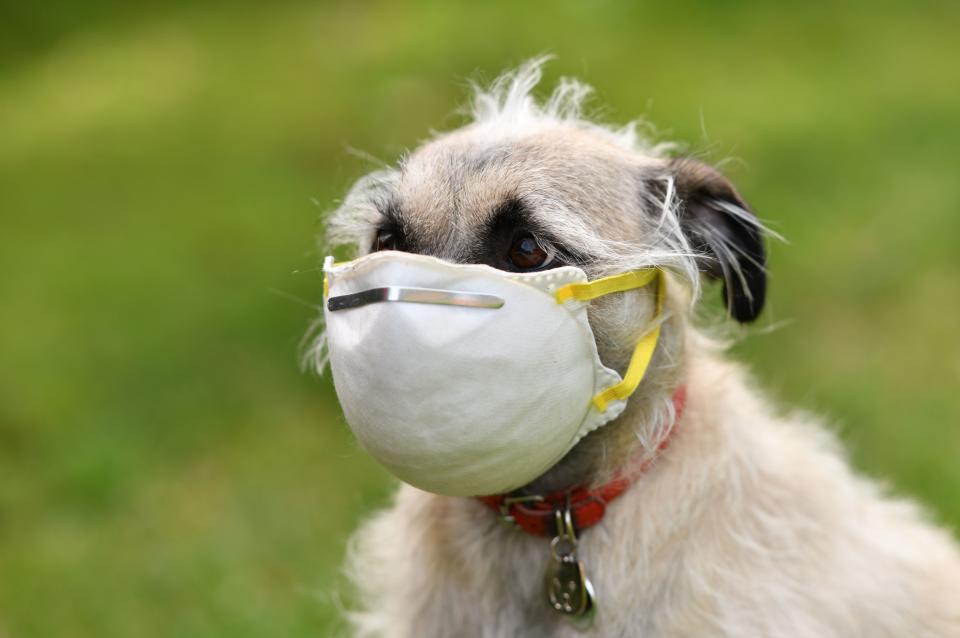Coronavirus: How susceptible are pets to the infection?

Concerns have been raised pets could become infected with the coronavirus.
The issue came to light when a dog in Hong Kong with an infected owner tested “weak positive” for the pathogen, but appeared in good health.
It is not just domestic animals that may be vulnerable. A tiger in New York developed the virus’ tell-tale dry cough after catching the infection from an asymptomatic zoo keeper.
Experts have largely dismissed fears these sort of animals can pass the virus to humans, however, it is less clear how the infection takes hold in our furry friends.
To learn more, scientists from the Chinese Academy of Agricultural Sciences looked at how the virus replicates in a host of animals.
They concluded the pathogen “replicates poorly” in dogs, pigs, chickens and ducks, however, ferrets and cats are “permissive to infection”.
While it may sound alarming, experts have stressed human-to-cat infection likely occurs at “low frequency”, with there still being no evidence the pets pass the virus to their owners.

Coronavirus: Are pets at risk of infection?
The coronavirus is one of seven strains of a virus class that are known to infect humans. Early research suggests it is mild in four out of five cases, however, it can trigger a respiratory disease called COVID-19.
Other strains cause everything from the common cold to severe acute respiratory syndrome (Sars), which killed 774 people during its 2002/3 outbreak.
Middle East respiratory syndrome (Mers), a coronavirus strain, killed 858 people during its 2012 outbreak.
Latest coronavirus news, updates and advice
Live: Follow all the latest updates from the UK and around the world
Fact-checker: The number of COVID-19 cases in your local area
Explained: Symptoms, latest advice and how it compares to the flu
Sars and Mers are both thought to have originated in bats, and “jumped” into humans via an intermediate host.
Masked palm civets were likely responsible for Sars, while Mers may have jumped from bats to camels to humans.
Research suggests the new coronavirus shares more than 96% of its DNA with a strain detected in horseshoe bats.
Although unclear, it may have jumped into humans via pangolins.
While certain animals can clearly pass coronaviruses to people, the Chinese scientists set out to uncover how susceptible “model laboratory animals, as well as companion and domestic animals” are to the new strain.
Ferrets are “commonly used as an animal model for respiratory viruses that infected humans” and were therefore included in the analysis.
The scientists isolated samples of the coronavirus from a patient or infected animal.
The study animals were then exposed to the pathogen.
Results, published in the journal Science, suggest the infection can take hold in ferrets and cats.
“Cat-to-cat infection was also demonstrated in one cat, which suggests aerosol droplets may be infectious,” said Professor Mick Bailey from the University of Bristol.
“Though exposure was continuous for an unspecified period of time and [the] cats may have spent some time spitting at each other”.
A cat in Belgium tested positive for the coronavirus after “catching” the infection from its owner.
Aside from ferrets and cats, the animals did not seem susceptible.
“The level of virus growth in dogs was very low and exposure did not lead to infection in two of five challenged animals,” said Professor Richard Tedder from Imperial College London.
“No shedding of virus was found to occur in any of the dogs nor was infection passed on neighbouring caged dogs.”

Coronavirus: Pets unlikely pass the infection to their owners, experts stress
The experts largely welcomed the research, however, some stressed it was carried out in a laboratory.
“The experimental transmission study was under very artificial conditions, giving cats high [virus] doses, which did lead to some limited onward transmission between cats, although numbers were very small,” said Professor James Wood from the University of Cambridge.
“These results are important but it is unlikely these conditions would occur in real life.”
Professor Wood added there is still no evidence an infected cat could pass the virus to its owner.
“The data overall suggest cats may become infected by their owners if their owners have COVID-19, but there is no suggestion they may transmit it to owners”, he said.
“It is possible to conceive of many routes that an infection can get into a household, but indirect means like through deliveries or on any animal are far less likely to transmit infection than direct transmission from someone who is infected.
“Despite over a million of cases of COVID-19 globally, there is no single public report that suggests patients may have become infected by their animals”.
As to why pets are unlikely to pass the infection to humans, Professor Wood pointed out the “relative size of a cat compared to a human means there is far less exhaled breath from one cat in a house”.
“Further, the grooming behaviour of cats means that they are more likely to catch infection from an owner than vice versa,” he added.
Despite the expert reassurance, government guidelines urge anyone isolating with the coronavirus’ tell-tale fever or cough to avoid animals, if possible.
The British Veterinary Association has recommended those with symptoms who own a cat keep it indoors as a precaution.
With there being much experts do not know about this new strain, this advice is likely erring on the side of caution.
“You can never entirely say never, but cats really aren’t playing a role in the spread of the virus,” said Dr Rachael Tarlinton from the University of Nottingham.
“There really isn’t need to be afraid for your cat, or of your cat”.
Professor Bailey agreed, adding the Chinese research is “best regarded as an opinion piece”.
“My take on this is human-to-cat infection can occur, but probably at low frequency”, he said.
“Infected cats may be able to infect other cats and I couldn't completely exclude the possibility they could infect humans, although there is no evidence for it.
“The fact lockdown seems to have worked in China, and be working in Italy and Spain, suggests reducing human-to human contact controls transmission”.

What is the coronavirus?
Since the coronavirus outbreak was identified, more than 1.4 million cases have been confirmed worldwide, according to Johns Hopkins University.
Of these cases, over 332,400 are known to have “recovered”.
Globally, the death toll has exceeded 88,900.
The coronavirus mainly spreads face-to-face via infected droplets expelled in a cough and sneeze.
There is also evidence it may be transmitted in faeces and can survive on surfaces.
Although most cases are mild, pneumonia can come about if the coronavirus spreads to the air sacs in the lungs.
This causes them to become inflamed and filled with fluid or pus.
The lungs then struggle to draw in air, resulting in reduced oxygen in the bloodstream and a build-up of carbon dioxide.
The coronavirus has no “set” treatment, with most patients naturally fighting off the infection.
Those requiring hospitalisation are given “supportive care”, like ventilation, while their immune system gets to work.
Officials urge people ward off the coronavirus by washing their hands regularly and maintaining social distancing.

 Yahoo Finance
Yahoo Finance 

